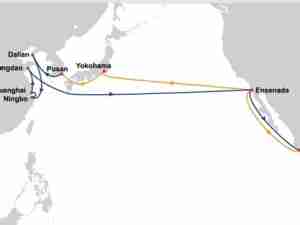'This is a win-win for the Port of Boston and its commercial fishermen,' said Michael A. Leone, Massport's Port Director. 'The grant will allow fishermen to conduct their business in a more energy efficient and cost effective manner, while helping Massport's maritime operations to be more environmentally friendly.'
Massport currently maintains two stations on the Fish Pier that supply shore-to-ship power for as many as four docked vessels, but more than a dozen fishing vessels regularly tie up at the pier. Most vessels use onboard diesel generators for power and heat. These generators release diesel fuel emissions and are expensive to run. The grant will let Massport upgrade the existing stations and add six new ones enabling up to 12 additional vessels to connect to shore power. The project is expected to eliminate 38 metric tons of carbon dioxide equivalents annually, or the same amount of carbon that would be sequestered by more than 8 acres of evergreen forest. Annual savings to fishermen will vary based on ship size and usage but are estimated to be thousands of dollars per ship based on current average prices for electricity and diesel fuel.
'Using funding from EPA and the Northeast Diesel Collaborative, Massport will drastically reduce diesel emissions from fishing vessels at the Boston Fish Pier,' said Ira Leighton, acting Regional Administrator of EPA's New England office. "This work will help protect the health of people who work and live nearby. We applaud Massport's innovative efforts to do their part to improve air quality."
'Massport's effort to secure a shore power grant for the Boston Fish Pier helps maintain the continued economic viability of the commercial fishing industry here,' said U.S. Rep. Stephen Lynch of South Boston. 'Electrification of the berths will result in some financial relief for fishermen by eliminating their reliance on diesel fuel, and significantly reduce vessel air emissions into the environment.'
The total cost of the project is roughly $507,000 with the remaining costs funded by Massport through in-kind services including project design, oversight, construction, oversight and inspection, and reporting results to EPA.
The electrification project is the most recent example of Massport's greening of the Port of Boston. Massport's Maritime Department recently commissioned a report by Weston Solutions, Inc. of West Chester, PA to provide an overview of its environmental performance. The Port Sustainability Progress Report highlights programs Massport put into place to improve its operations and development of maritime terminals and other properties in an environmentally sensitive manner. Massport's maritime report is featured on EPA's website as an example of a port taking a lead in developing its own "green port" initiatives.
The electrification project is the most recent component in Massport's effort to make green investments in the Port of Boston that enhance efficiency and productivity. In 2003, Conley Container Terminal became one of the first terminals in the nation to develop and implement an Environmental Management System (EMS) that has been certified to the ISO-14001 standard. It has been successfully recertified every year since.
The Port of Boston's vessel and cargo activity support 34,000 jobs, and contributes more than $2 billion to the local, regional, and national economies through






